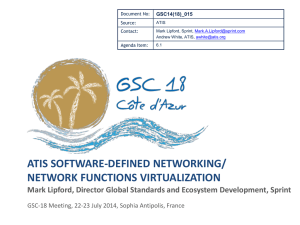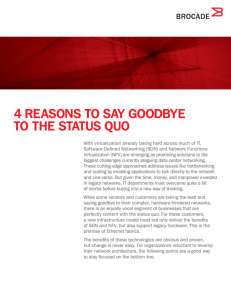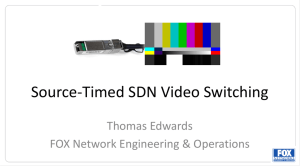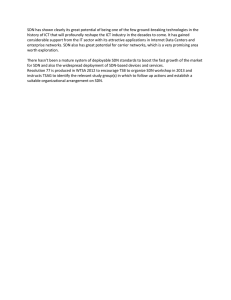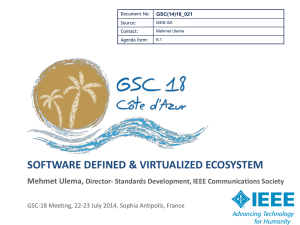REPORT FROM SESSION #2: SDN/NFV GSC(14)18_041
advertisement
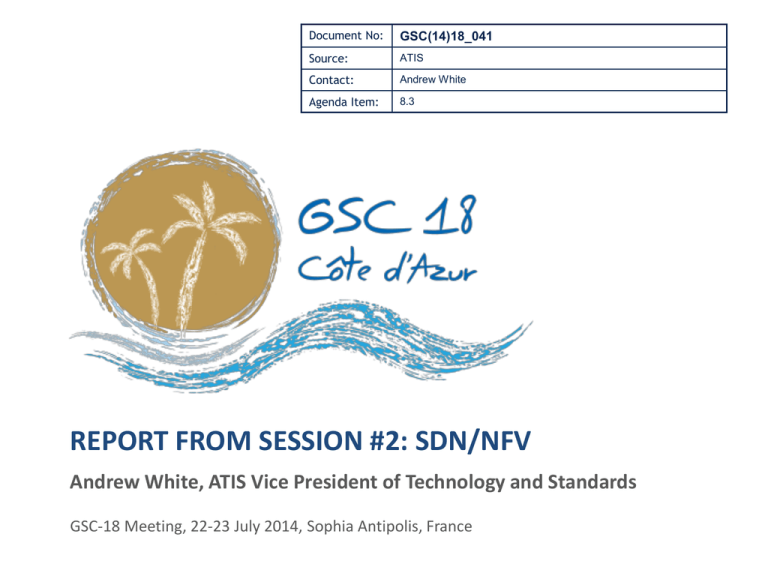
Document No: GSC(14)18_041 Source: ATIS Contact: Andrew White Agenda Item: 8.3 REPORT FROM SESSION #2: SDN/NFV Andrew White, ATIS Vice President of Technology and Standards GSC-18 Meeting, 22-23 July 2014, Sophia Antipolis, France SDN/NFV SUMMARY - IEEE • New initiatives: • “Rapid Reaction Standardization Research Team” meeting held on April 25, 2014 • 16 attendees from 7 companies (operators, manufactures, others), 2 universities, worldwide representation • 17 gap items identified, 4 new groups formed: • Study Group (SG) on Security, Reliability and Performance for Software Defined • • • and Virtualized Ecosystems Research Group (RG) on Software Defined and Virtualized Wireless Access Research Group (RG) on Structured Abstractions Study Group (SG) on Service Virtualization • New work under existing IEEE projects • IEEE P1903 – Next Generation Service Overlay Networks (NGSON) • IEEE P802.1CF OmniRAN Task Group GSC-18, 22-23 July 2014, Sophia Antipolis 2 SDN/NFV SUMMARY - ATIS ATIS has identified common principles providing insight into important aspects of SDN/NFV as a foundation for shaping its program: • Focus on the interoperability and interworking between service providers • Engage web-scale companies with easy-to-use capabilities • Develop services that enable and enhance the user experience • Preserve and enhance the value of the network The industry is facing a software skills gap with the move from hardware-based solutions to software-based solutions. GSC-18, 22-23 July 2014, Sophia Antipolis 3 SDN/NFV SUMMARY - TTC • Application Driven Thinking • Top-down dynamic update of software • User, app, device, service-oriented modeling • Deep (Data Plane) Programmability • SDN data plane as a network function in NFV • Data plane slicing (virtualization) • Evolve-able APIs • New protocol handling • Programming Model • Toy-Block Networking • Accommodate a wide range of programmers • Marketing of reusable network functions blocks GSC-18, 22-23 July 2014, Sophia Antipolis 4 SDN/NFV SUMMARY - TTA • SDN/NFV standardization in software platform and relevant interfaces are actively in progress but that of hardware platform is relatively in active. For open hardware platform standardization requires attention • Transport SDN seems a common interest as a high priority item among fixed or wireless carriers. Faster standardization efforts may help the relevant industry • Standardization of SDN South/North-bound APIs are under active progress but East-West interface needs coordination • Autonomic management and control (AMC) in relation with SDN/NFV are also attracting attentions for cloud data center management and M2M/IoT infrastructure management. GSC-18, 22-23 July 2014, Sophia Antipolis 5 SDN/NFV SUMMARY - ETSI • Tremendous amount of work achieved • Big, well established and very active community • First results published (6 docs), major step forward. • Next results stabilized (17 docs), pub 2014Q4 • This is just a start • Next step • Focus on interoperability through normative specs and tests • Cooperate to accelerate • Implementation in specific Use Cases (relevant to 3GPP, BBF, Linux foundation,…). Remain the “centre of gravity” for the global industry to collaborate on NFV GSC-18, 22-23 July 2014, Sophia Antipolis 6 OBSERVATIONS AND RECOMMENDATIONS In an effort to enhance global cooperation and collaboration regarding SDN/NFV standards the panel identified the following common views and collaboration opportunities: • User experiences are driven by applications. Build networks that support integrated and trustworthy delivery of services • Software solutions are dominating and recognized as not only a means to reduce expenses but to creating new value • Deeper programmability within the network should bring innovative new services • Application use cases of SDN and NFV should drive identification and clarification of necessary extensions to the current SDN and NFV GSC-18, 22-23 July 2014, Sophia Antipolis 7 OBSERVATIONS AND RECOMMENDATIONS • Each SDO is completing a gap analysis of the SDN/NFV landscape. Using this activity to gain common perspective results in more effective collaboration • Coordinate the development of distributed SDN/NFV standards and software to promote a cohesive framework • Sharing views and directions among related SDOs is necessity to accelerate synergy and to avoid overlapping efforts and to define the overall landscape • A software skills gap exists as a result of the move from hardware-based solutions to software-based solutions GSC-18, 22-23 July 2014, Sophia Antipolis 8
